动物隐喻在汉语和英语中的比较
英汉语言中动物喻人的感情意义对比
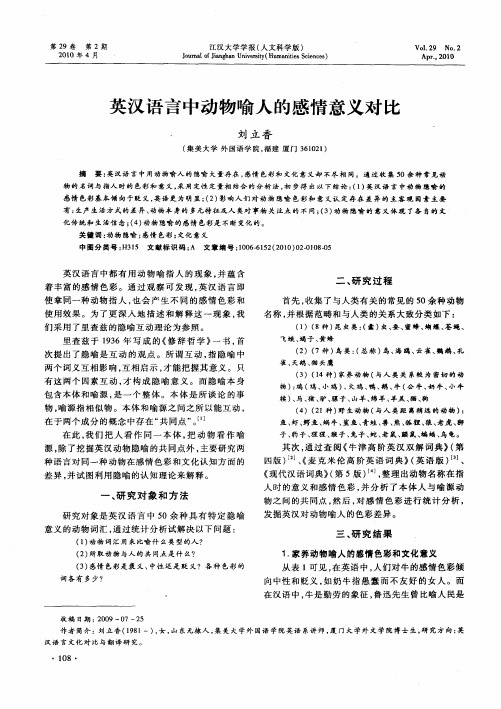
在 于两个 成分 的概 念 中存 在 “ 同点 ” … 共 。 在此 , 我们 把 人 看 作 同一 本 体 , 动 物 看 作 喻 把
源 , 了挖 掘英 汉 动物 隐喻 的共 同点外 , 除 主要研 究 两
种 语 言 对 同 一 种 动 物 在 感 情 色 彩 和 文 化 认 知 方 面 的
鸥直 接 指人 , 要 因为 人 们 古 代 的生 产 生 活 中海 鸥 主 并不 多 见 , 同样 云 雀也 不 多 见 , 而 , 然 有 一定 的 因 虽 褒义 , 并不 用 来 指 称 人类 。而 与 人 类 关 系颇 为 密 但
切 的猫 头鹰 却有 着 不 同的 感 情 色彩 , 语 中 指称 那 英
英 汉语 言 中都有 用 动 物 喻 指人 的现 象 , 蕴 含 并 着 丰富 的感情 色 彩 。通 过 观 察 可发 现 , 汉 语 言 即 英
二 、 究 过 程 研
首先 , 集 了与人类 有关 的常 见 的 5 收 0余种 动物 名称 , 根据 范畴 和与人 类 的关 系大致分 类如 下 : 并
汉语言文化对比与翻译研究。
・
1 O8 ・
21 0 0年 第 2期
刘 立 香 : 汉 语 言 中动 物 喻 人 的感 情 意 义 对 比 英
牛 , 的是 草 , 出来 的是 奶 , 吃 挤 牛犊 的感 情 色 彩 也 是 褒 义 的 , 以用 来 指 勇 敢 的 年 轻 人 。牛 的吃 苦 耐 劳 可
让人 联想 到某 些 只知 偷 懒 而 对 工 作不 太 认 真 的 人 , 英语 中并 没用 天鹅 来指 称人 , 但是 用作 动词 , 指人 放
关, 而骂人 为猫 头鹰 指人不 吉 利 , 因为猫 头鹰 叫声凄
从文化角度对比研究中英文中动物的隐喻现象

从文化角度对比研究中英文中动物的隐喻现象发表时间:2018-09-18T10:07:40.793Z 来源:《知识-力量》2中作者:袁琳利[导读] 近年来,隐喻是一个众多学科关注的热门话题,尤其是隐喻的认知功能现在越来越受到人们的重视。
概念隐喻在不同领域的应用反映了隐喻的认知是普遍跨文化的,同时,由于不同的社会和文化背景,在应用的时候也存在着许多的不同。
因此,为了避免不同文化之间的误解,在跨文化交流时我们应当考虑语境因素。
本主要从认知的角度讨论了动物隐喻在中文和英语中的相同和不同之处,通过分析其在中文和英文不同的隐喻表达,例如,“公鸡”。
(云南师范大学外国语学院,云南省昆明市 650500)摘要:近年来,隐喻是一个众多学科关注的热门话题,尤其是隐喻的认知功能现在越来越受到人们的重视。
概念隐喻在不同领域的应用反映了隐喻的认知是普遍跨文化的,同时,由于不同的社会和文化背景,在应用的时候也存在着许多的不同。
因此,为了避免不同文化之间的误解,在跨文化交流时我们应当考虑语境因素。
本主要从认知的角度讨论了动物隐喻在中文和英语中的相同和不同之处,通过分析其在中文和英文不同的隐喻表达,例如,“公鸡”。
关键词:隐喻,跨文化交际,公鸡1. 隐喻与文化英语中的“隐喻”一词来源于希腊语“隐喻”。
它指的是一组特定的语言过程,其中一个对象的各个方面被传递或转移到另一个对象,因此第二个对象被说成是第一个对象。
近年来,随着全球化的发展,人们看到了最为密切的跨文化交际。
隐喻被认为是人类赖以生存的方式,是人类认知、思维、经验、语言乃至行为的基础,可以看作是人类文化的反映。
1.1跨文化中的隐喻文化被定义为一个社会的信念和实践的总和;没有什么比它的信仰被表达和传递的语言更重要的战略重要性,并且它的成员之间的大多数互动发生。
隐喻是一种普遍存在的现象,在不同的文化中,隐喻的结构因文化的不同而不同,在跨文化交际中应特别注意隐喻的理解。
例如,隐喻动物词汇的形成与生产劳动密切相关。
动物在中英文隐喻中的内涵异同

物的隐喻表达则使这一语体更毛富多彩, 使其生动性锦上添
花。 但是有关同一动物的隐喻句子反映在中西两大文化背景下 内涵相差甚远。其原因是不同的民族有着不同的文化渊源, 其 赋予各种特定动物的含义有时相通, 有时大相径庭。所以隐喻
谈到动物中国人对狐狸没有好印象。狡猾多疑的人被称 为“ 狐狸” ;勾结在一起的坏人被称为“ 狐朋狗党” ;依仗别人势
参考文献 :
[1]孙振东, 满其民 .现代教育理论.南海出版公司, 1996年
做题 目。 五、 培养学生良好的学习兴趣与学法
兴趣是最好的老师。 激发和培养学生的学习兴趣, 充分调 动积极性, 发挥主观能动性, 是提高职高高三英语教学质量的 前提和保证。 学习兴趣不仅需要教师在课堂上激发, 还需要 在课下培养和保持,以便使学生始终处于积极主动的精神状 态, 轻松愉快地学习英语。 ( 一)激发与培养兴趣的几种途径。 1. 教师良好的精神状态和师生间的情感交流。 在问卷调查中, 94%的学生回答:教师的精神状态对学生 的精神状态影响很大。 因而, 教师应以饱满的精神状态上好每 一堂课, 从仪表到一言一行向学生传递出热爱并热衷于教学 活动的信息, 以期学生报以专心和热情, 积极参与教学活动。 2. 教师的教学方法和语言艺术。 教师在教学活动中忽视学生的主体作用, 教学缺少主体 的参与, 这就严重违背了教学规律。 因此教师在教学中应注重 教学 法和艺术, 以简洁、 明快、 幽默的语言, 以流利的英语口 语直接吸引学生参与教学活动, 激起他们的兴趣。 教学 法上
力的人被称为 “ 狐假虎威”……而在英语里fox也没什么好名
声。 在英语中, 狡猾多端的 人被称为 fox.如:He is a cunningfox.
应注重精讲多练, 置学生于主体地位, 创设“ 表现” 环境; 知识 的讲解应举一反三, 化难为易, 让学生“ 跳一跳能摘到果子” , 体验成功感。 3. 挖掘教材趣味性, 兼顾背景知识教学。 高三英语教学不能只注重对知识的讲解。教材内容中有 不少是关于英语国家文化、 习俗、 思维方式的材料 , 另外还有 大量关于人类面临的热点问题的材料。这些材料能激发学生 了解世界、 走向世界的渴望, 能激发学生的学习兴趣 , 教师应
英汉语言中动物名称的隐喻现象
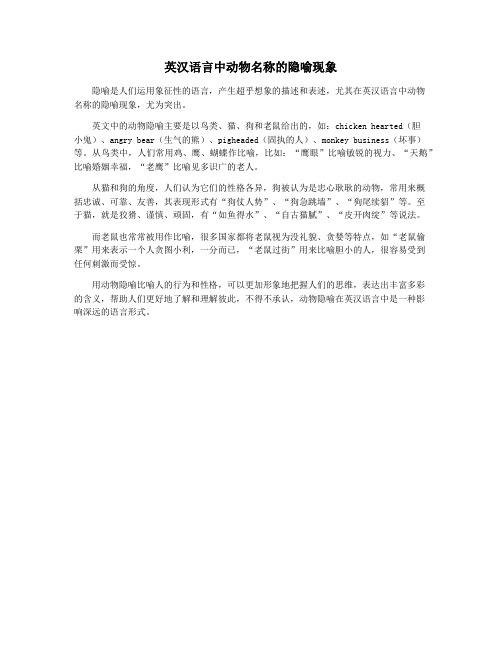
英汉语言中动物名称的隐喻现象
隐喻是人们运用象征性的语言,产生超乎想象的描述和表述,尤其在英汉语言中动物
名称的隐喻现象,尤为突出。
英文中的动物隐喻主要是以鸟类、猫、狗和老鼠给出的,如:chicken hearted(胆
小鬼)、angry bear(生气的熊)、pigheaded(固执的人)、monkey business(坏事)等。
从鸟类中,人们常用鸡、鹰、蝴蝶作比喻,比如:“鹰眼”比喻敏锐的视力、“天鹅”比喻婚姻幸福,“老鹰”比喻见多识广的老人。
从猫和狗的角度,人们认为它们的性格各异,狗被认为是忠心耿耿的动物,常用来概
括忠诚、可靠、友善,其表现形式有“狗仗人势”、“狗急跳墙”、“狗尾续貂”等。
至
于猫,就是狡猾、谨慎、顽固,有“如鱼得水”、“自古猫腻”、“皮开肉绽”等说法。
而老鼠也常常被用作比喻,很多国家都将老鼠视为没礼貌、贪婪等特点,如“老鼠偷栗”用来表示一个人贪图小利,一分而已,“老鼠过街”用来比喻胆小的人,很容易受到
任何刺激而受惊。
用动物隐喻比喻人的行为和性格,可以更加形象地把握人们的思维,表达出丰富多彩
的含义,帮助人们更好地了解和理解彼此,不得不承认,动物隐喻在英汉语言中是一种影
响深远的语言形式。
中英动物词汇“狗”的隐喻含义比较[Word文档]
![中英动物词汇“狗”的隐喻含义比较[Word文档]](https://img.taocdn.com/s3/m/23d67225a31614791711cc7931b765ce04087a4e.png)
中英动物词汇“狗”的隐喻含义比较[Word文档] 中英动物词汇“狗”的隐喻含义比较本文档格式为WORD,感谢你的阅读。
最新最全的学术论文期刊文献年终总结年终报告工作总结个人总结述职报告实习报告单位总结演讲稿中英动物词汇“狗”的隐喻含义比较摘要:在人们的生活中,隐喻一直都扮演着重要的角色。
传统隐喻认为隐喻是一种修辞手段,而随着语言学的发展,隐喻逐渐成为人们认识和了解世界的一种方式。
动物作为人类的亲密伙伴之一,动物隐喻自然频繁在出现在人类语言当中。
本文旨在探讨中英语言中,动物词汇“狗”的隐喻含义差异,及导致这种差异的原因。
使学习者能够意识到文化差异对语言的影响。
关键词:隐喻;文化差异;动物词汇动物是人类最密切的伙伴之一,由于这种关系,与动物相关的词汇也越来越多地充斥着人们的语言,比如“一朝被蛇咬十年怕井绳”、“夜猫子进宅无事不来”、“狗咬吕洞宾不识好人心”等等。
在众多的与动物相关的词汇中,其背后都暗含着一定的隐喻含义。
鉴于动物种类繁多,本文主要研究与“狗”有关的动物词汇。
自古以来狗就是一种常见的动物,在现代社会,狗更是一种饲养率极高的宠物。
与此同时,他在社会上也占有一定地位,因为他们充当着畜牧犬、医疗犬、搜救犬、导盲犬等不可或缺的社会角色。
一、动物词汇“狗”在汉语中的概念隐喻在汉语中,与狗有关的词汇既有褒义的,也有贬义的。
因为狗是人类最早驯化的家畜,比较常见。
同时,由于狗看家护院的角色早已深入人心,所以狗在汉民族人心中的形象不是很好。
大部分与狗有关的词汇都是贬义的,表达讨厌、咒骂等消极情感。
人们捕捉狗这一小动物身上的一些特点,映射到抽象的概念域,目的是为了更加形象具体的表达自己的想法。
与狗有关的隐喻主要表达如下几方面的含义:1.1身份卑微狗的嗅觉以及听觉比较灵敏,人们养狗或者作为宠物消遣娱乐或者看家护院。
古时候人们经常用“犬”来表达自谦,比如“犬子”、“犬女”、“犬马”、“犬舍”、“狗窝”,主要是为了抬高对方的身份。
英汉动物隐喻的对比及翻译

英汉动物隐喻的对比及翻译
隐喻在汉语和英语这两种语言中都是很重要的修:辞格。
不同的语言与文化背景下的人们对隐喻这种修辞手法的认知具有一定共性,但其差异性也不容忽视,动物词在这方面尤为明显。
本文总结了英汉两种语言中隐喻的含义,以此为背景通过对比动物词在英汉两种语言中的喻义,分析了喻义、喻体相同的动物词,喻体相同、喻义不同的动物词以及动物词喻义缺失现象这三个方面,提出了一些翻译。
上应注意的事项,希望对英汉翻译、文化以及隐喻的研究贡献绵薄之力。
英汉语言中关于动物“牛”的隐喻分析
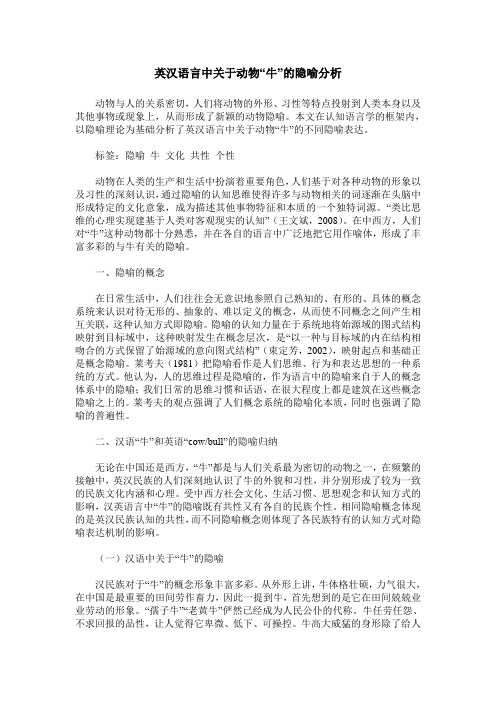
英汉语言中关于动物“牛”的隐喻分析动物与人的关系密切,人们将动物的外形、习性等特点投射到人类本身以及其他事物或现象上,从而形成了新颖的动物隐喻。
本文在认知语言学的框架内,以隐喻理论为基础分析了英汉语言中关于动物“牛”的不同隐喻表达。
标签:隐喻牛文化共性个性动物在人类的生产和生活中扮演着重要角色,人们基于对各种动物的形象以及习性的深刻认识,通过隐喻的认知思维使得许多与动物相关的词逐渐在头脑中形成特定的文化意象,成为描述其他事物特征和本质的一个独特词源。
“类比思维的心理实现建基于人类对客观现实的认知”(王文斌,2008)。
在中西方,人们对“牛”这种动物都十分熟悉,并在各自的语言中广泛地把它用作喻体,形成了丰富多彩的与牛有关的隐喻。
一、隐喻的概念在日常生活中,人们往往会无意识地参照自己熟知的、有形的、具体的概念系统来认识对待无形的、抽象的、难以定义的概念,从而使不同概念之间产生相互关联,这种认知方式即隐喻。
隐喻的认知力量在于系统地将始源域的图式结构映射到目标域中,这种映射发生在概念层次,是“以一种与目标域的内在结构相吻合的方式保留了始源域的意向图式结构”(束定芳,2002),映射起点和基础正是概念隐喻。
莱考夫(1981)把隐喻看作是人们思维、行为和表达思想的一种系统的方式。
他认为,人的思维过程是隐喻的,作为语言中的隐喻来自于人的概念体系中的隐喻;我们日常的思维习惯和话语,在很大程度上都是建筑在这些概念隐喻之上的。
莱考夫的观点强调了人们概念系统的隐喻化本质,同时也强调了隐喻的普遍性。
二、汉语“牛”和英语“cow/bull”的隐喻归纳无论在中国还是西方,“牛”都是与人们关系最为密切的动物之一,在频繁的接触中,英汉民族的人们深刻地认识了牛的外貌和习性,并分别形成了较为一致的民族文化内涵和心理。
受中西方社会文化、生活习惯、思想观念和认知方式的影响,汉英语言中“牛”的隐喻既有共性又有各自的民族个性。
相同隐喻概念体现的是英汉民族认知的共性,而不同隐喻概念则体现了各民族特有的认知方式对隐喻表达机制的影响。
英汉动物隐喻对比——以十二生肖中的“猪”“牛”“鸡”为例

英汉动物隐喻对比——以十二生肖中的“猪”“牛”“鸡”为例摘要:动物和人类的活动的相同之处在语言层面上称为动物隐喻。
动物隐喻在英汉两种语言中均有广泛的使用,他使语言生气勃勃,形象鲜明。
本文以认知语言学中的概念隐喻理论为基础,借助中国传统文化中的生肖动物“猪”,“牛”,“鸡”,通过对这三种动物在英汉语中的隐喻意义的深入对比研究,揭示出英汉动物隐喻异同的原因。
关键词:动物隐喻;生肖;猪;牛;鸡隐喻的研究已有2000多年的历史,是人类语言发展的特殊产物。
动物隐喻是人类认知中最重要的隐喻之一。
对英汉生肖动物隐喻的研究,不但对人们在日后生活中能更好的认识和运用动物隐喻有所帮助,而且在中国传统文化对外传播上也是有意义的。
一、动物隐喻的理论基础1.1 概念隐喻美国学者Lakoff和Johnson在《我们赖以生存的隐喻》一书中说:“隐喻不仅普遍存在于语言中,也存在于思想和行为中。
我们思考和行动的普通概念系统本质上是隐喻性的”。
他们从认知语言学的角度提出了概念隐喻理论这样一个新理论。
对隐喻的内涵有以下三种理解: 第一,隐喻不是一种特殊的语言表达手段,而是一种语言规范,它广泛地反映在人们的日常生活中。
其次,隐喻的产生和发展具有很大的随机性,不同的隐喻会形成一个网络结构,对人们的思维产生深远的影响。
第三,隐喻不是简单的语言产物,而是通过语言反映了一种独特的思维方式。
因此,隐喻在日常生活中屡见不鲜。
动物隐喻属于概念隐喻中的实体隐喻。
实体隐喻是指利用物体的概念或结构来认识和理解我们的经验。
把抽象的、模糊的思想、感情、心理活动、事件、状态等无形的概念看成具体的、有形的实体,以便对其进行讨论、量化,确定其特征和原因。
1.2 动物隐喻动物隐喻现象在生活中很常见,我们经常用一些动物来比喻一些人和事,人们会把抽象、模糊的思维方式变成具体、有形的人或物。
隐喻的映射具有一定的层次性和系统性,动物隐喻的映射机制也是如此。
同一个动物可以用来解释多个抽象的事物或概念,同一个抽象的事物或概念也可以通过多种动物来理解,例如:“猪”可以用来指“笨”、“懒”、“脏”等一系列形象,而“牛”和“马”都可以象征吃苦耐劳、无私奉献这样优秀的品质。
英汉动物习语隐喻对比浅析

2412019年48期总第488期ENGLISH ON CAMPUS英汉动物习语隐喻对比浅析文/郑紫元一、研究目的及意义目前,许多研究者都集中在隐喻的研究上,隐喻对理解起着至关重要的作用。
《我们赖以生存的隐喻》一书的内容认为,无论是在思想上还是在行动上,隐喻都普遍存在于日常生活中。
隐喻在本质上是认知的。
认知语言学认为, 隐喻思维能力是随着人们认知的发展而产生的一种创造性的思维能力,是认知发展的高级阶段,是人们认知世界,特别是认知抽象事物不可缺少的一种认识能力。
人和动物有许多不同和相同之处,通过对动物习语的研究,我们可以对不同种类的动物有更多的了解。
此外,我们可以更多地了解自己和彼此。
英汉动物习语隐喻能使我们更好地理解历史和文化。
在一些人的心目中,理解动物隐喻的困难总是存在的。
通过分析这些差异,可以很容易地理解动物隐喻。
本文的研究在一定程度上可以帮助外语学习者获得动物习语的真实意义。
减少他们在谈话中遇到的失败。
二、同一动物形象的不同喻义1.狗。
狗是一种非常常见的动物,通常被人们当作宠物或者用来看守或猎食。
当然,在英汉动物习语中,狗的喻义也存在差异。
在中英文化中,狗与人类都有着密切的关系,但最明显的区别是人对狗的态度。
汉语中,很多关于狗的习语都是谈论人类的行为或特征,表达他们的感情和态度。
通常情况下对狗的表述都是否定的。
例如:狗仗人势、狼心狗肺、狗改不了吃屎、狗男女等等。
然而许多研究表明,狗在英语中的含义与在汉语中有很大的不同。
狗在英语中常用作积极意义。
例如 Every dog has his day在这句话中,比喻不幸的人。
从字面意义上我们可以看出,狗不会一直悲惨,总有一天它会遇到好运。
就像人一样,生活是波澜起伏的,人不可能事事顺利,所以生活是公平的,人必须坚持追求,美好的一天即将到来;Experience is the blind man’s dog.导盲犬是帮助盲人的最重要工具。
所以在这句话里,把经验比作是狗。
浅析英汉动物词“狗”的隐喻对比
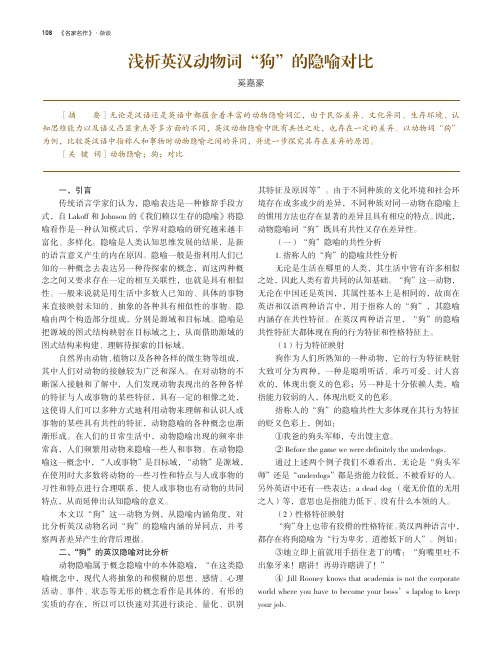
108《名家名作》·杂谈一、引言传统语言学家们认为,隐喻表达是一种修辞手段方式,自Lakoff和Johnson的《我们赖以生存的隐喻》将隐喻看作是一种认知模式后,学界对隐喻的研究越来越丰富化、多样化。
隐喻是人类认知思维发展的结果,是新的语言意义产生的内在原因。
隐喻一般是指利用人们已知的一种概念去表达另一种待探索的概念,而这两种概念之间又要求存在一定的相互关联性,也就是具有相似性。
一般来说就是用生活中多数人已知的、具体的事物来直接映射未知的、抽象的各种具有相似性的事物。
隐喻由两个构造部分组成,分别是源域和目标域。
隐喻是把源域的图式结构映射在目标域之上,从而借助源域的图式结构来构建、理解待探索的目标域。
自然界由动物、植物以及各种各样的微生物等组成,其中人们对动物的接触较为广泛和深入。
在对动物的不断深入接触和了解中,人们发现动物表现出的各种各样的特征与人或事物的某些特征,具有一定的相像之处,这使得人们可以多种方式地利用动物来理解和认识人或事物的某些具有共性的特征,动物隐喻的各种概念也渐渐形成。
在人们的日常生活中,动物隐喻出现的频率非常高,人们频繁用动物来隐喻一些人和事物。
在动物隐喻这一概念中,“人或事物”是目标域,“动物”是源域,在使用时大多数将动物的一些习性和特点与人或事物的习性和特点进行合理联系,使人或事物也有动物的共同特点,从而延伸出认知隐喻的意义。
本文以“狗”这一动物为例,从隐喻内涵角度,对比分析英汉动物名词“狗”的隐喻内涵的异同点,并考察两者差异产生的背后理据。
二、“狗”的英汉隐喻对比分析动物隐喻属于概念隐喻中的本体隐喻,“在这类隐喻概念中,现代人将抽象的和模糊的思想、感情、心理活动、事件、状态等无形的概念看作是具体的、有形的实质的存在,所以可以快速对其进行谈论、量化、识别其特征及原因等”。
由于不同种族的文化环境和社会环境存在或多或少的差异,不同种族对同一动物在隐喻上的惯用方法也存在显著的差异且具有相应的特点。
中英动物词汇“狗”的隐喻含义比较
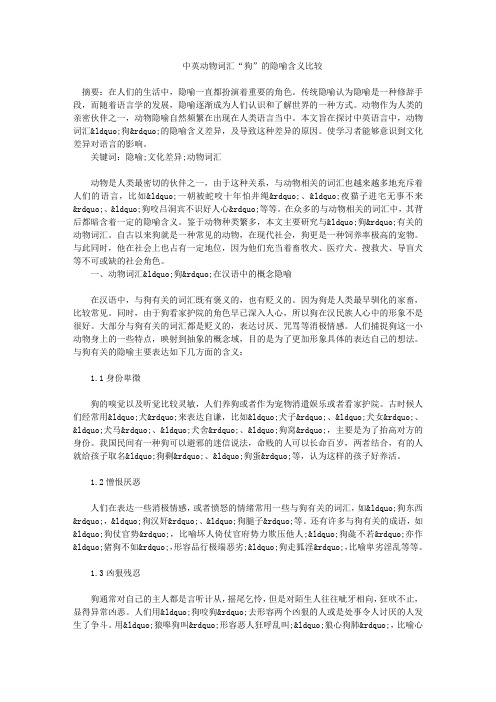
中英动物词汇“狗”的隐喻含义比较摘要:在人们的生活中,隐喻一直都扮演着重要的角色。
传统隐喻认为隐喻是一种修辞手段,而随着语言学的发展,隐喻逐渐成为人们认识和了解世界的一种方式。
动物作为人类的亲密伙伴之一,动物隐喻自然频繁在出现在人类语言当中。
本文旨在探讨中英语言中,动物词汇“狗”的隐喻含义差异,及导致这种差异的原因。
使学习者能够意识到文化差异对语言的影响。
关键词:隐喻;文化差异;动物词汇动物是人类最密切的伙伴之一,由于这种关系,与动物相关的词汇也越来越多地充斥着人们的语言,比如“一朝被蛇咬十年怕井绳”、“夜猫子进宅无事不来”、“狗咬吕洞宾不识好人心”等等。
在众多的与动物相关的词汇中,其背后都暗含着一定的隐喻含义。
鉴于动物种类繁多,本文主要研究与“狗”有关的动物词汇。
自古以来狗就是一种常见的动物,在现代社会,狗更是一种饲养率极高的宠物。
与此同时,他在社会上也占有一定地位,因为他们充当着畜牧犬、医疗犬、搜救犬、导盲犬等不可或缺的社会角色。
一、动物词汇“狗”在汉语中的概念隐喻在汉语中,与狗有关的词汇既有褒义的,也有贬义的。
因为狗是人类最早驯化的家畜,比较常见。
同时,由于狗看家护院的角色早已深入人心,所以狗在汉民族人心中的形象不是很好。
大部分与狗有关的词汇都是贬义的,表达讨厌、咒骂等消极情感。
人们捕捉狗这一小动物身上的一些特点,映射到抽象的概念域,目的是为了更加形象具体的表达自己的想法。
与狗有关的隐喻主要表达如下几方面的含义:1.1身份卑微狗的嗅觉以及听觉比较灵敏,人们养狗或者作为宠物消遣娱乐或者看家护院。
古时候人们经常用“犬”来表达自谦,比如“犬子”、“犬女”、“犬马”、“犬舍”、“狗窝”,主要是为了抬高对方的身份。
英汉动物词汇的文化内涵及翻译启示

英汉动物词汇的文化内涵及翻译启示英语中pig的喻义也基本一样,可用pig比喻a greedy,dirty or bad-mannered person (贪婪、肮脏、粗野之人),如: eat like a pig (大吃大喝)make a pig of oneself (吃得过多)1.2动物词的文化意义在英汉中的异同点由于两国文化的差异,在有些情况下,它们所代表的含义大庭相径。
下文以dragon(龙)、dog(狗)为例。
龙是中西方文化神话传说中的动物。
中文的“龙”是吉祥尊贵的,而英文中dragon 是邪恶凶残的,两者形成鲜明对比。
封建社会中“龙”是帝王的象征,历代皇帝都自称为“真龙天子”。
时至今日,龙在人们心中仍是至高无上的。
中国人把自己的国家称作“东方巨龙”,龙被看成是中华民族的图腾。
汉语中有许多关于龙的成语,如龙凤呈祥,龙飞凤舞,生龙活虎都展现了龙在汉文化中的文化内涵。
然而在西方文化中,人们却认为dragon 是邪恶的代表,是一种狰狞的怪兽,是恶魔的化身。
汉语中与狗有关的习语大都含有贬意:"狐朋狗党"、"狗急跳墙"、"狼心狗肺"、"狗腿子"、“狗眼看人低”、“狗头军师、” “丧家之犬、”“狗咬吕洞宾不识好人心、”“狗嘴里吐不出象牙来”等,尽管近些年来养庞物狗的人数大大增加,狗的"地位"似乎有所改变,但狗的贬义形象却深深地留在汉语言文化中。
而在西方英语国家,狗被认为是人类最忠诚的朋友、被视为爱畜。
英语中有关狗的习语除了一部分因受其他语言的影响而含有贬义外,大部分都没有贬义。
在英语习语中,常以狗的形象来比喻人的行为,如you are a lucky dog (你是一个幸运儿),every dog has his day(凡人皆有得意日),old dog will mot learn mew tricks(老人学不了新东西)等等,或者以狗比人,如a top dog (优胜者);a gay dog(快活人);a sea dog(老练水手);a water dog (水性好的人) 等等。
中英文动物名词的引申义和隐喻现象

中英文动物名词的引申义和隐喻现象1. 中英文动物名词的引申义1. 中英文动物名词的引申义狐狸:狐狸被认为是狡猾的,因为它们可以聪明地解决问题。
狐狸也被视为机敏、灵活、机智、狡诈和敏锐的象征。
Fox:Fox is thought to be cunning because they can solve problems smartly. Foxes are also seen as symbols of being shrewd, agile, witty, sly, and sharp.狼:狼被视为狡诈、残忍和凶恶的象征,但也被视为勇敢、忠诚和团结的象征。
Wolf: Wolves are seen as symbols of being cunning, cruel, and vicious, but also of being brave, loyal, and united.老鼠:老鼠被视为勤劳、机灵和聪明的象征,但也被视为破坏性的象征。
Mouse: Mice are seen as symbols of being industrious, clever, and intelligent, but also of being destructive.熊:熊被视为强大、勇敢和有力的象征,但也被视为暴力、凶恶和威胁的象征。
Bear: Bears are seen as symbols of being strong, brave, and powerful, but also of being violent, vicious, and threatening.猫:猫被视为狡猾、狡诈和敏锐的象征,但也被视为友善、温柔和慈爱的象征。
Cat: Cats are seen as symbols of being cunning, sly, and sharp, but also of being friendly, gentle, and loving.2. 中英文动物名词的隐喻现象中英文动物名词的隐喻现象在日常生活中十分常见。
从动物词汇看英汉文化内涵.
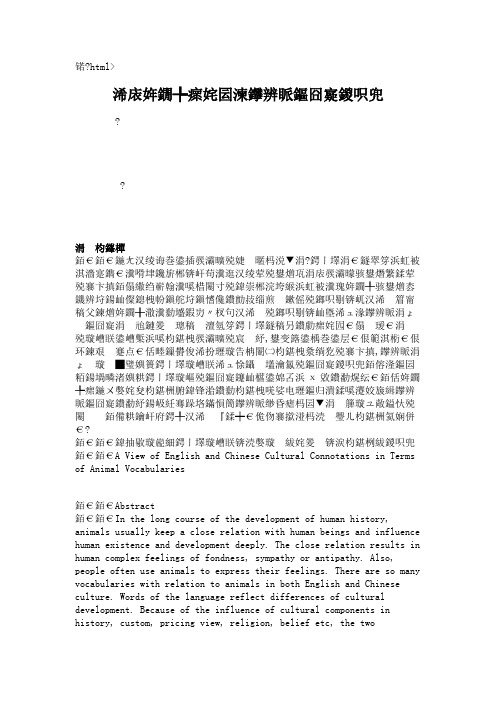
从动物词汇看英汉文化内涵??中文摘要在人类历史发展的漫长进程中,动物一直与人类保持着密切联系,并对人类的生存与发展产生深刻的影响。
这种亲密无间的关系使得人类对动物产生喜爱或同情或厌恶或恐惧的错综复杂的情感,人们也常常借动物来寄托和表达人们的情感,所以在英汉两种文化中都有许许多多与动物相关的词汇。
语言中的词汇反映了文化发展的差异,由于受历史、习俗、价值观念、宗教信仰等诸方面文化因素的影响,英汉两种语言赋予动物词汇以各自特定的文化内涵。
本文结合实例从动物词的文化背景及其产生的基础、动物词在英汉文化中具有的文化内涵等方面分析比较英汉文化的异同,并分析了英汉翻译过程中应该注意的问题。
从而帮助人们顺利、恰当地进行跨文化交流。
关键词:动物词汇;英语;汉语;文化;内涵A View of English and Chinese Cultural Connotations in Terms of Animal VocabulariesAbstractIn the long course of the development of human history, animals usually keep a close relation with human beings and influence human existence and development deeply. The close relation results in human complex feelings of fondness, sympathy or antipathy. Also, people often use animals to express their feelings. There are so many vocabularies with relation to animals in both English and Chinese culture. Words of the language reflect differences of cultural development. Because of the influence of cultural components in history, custom, pricing view, religion, belief etc, the two languages, Chinese and English, give their own connotations to animal words. This article is about contrasting the cultural similarities and differences in terms of animal words’ cultural backgrounds and their fundaments, and cultural connotations of animal words in English and Chinese. It also analyzes how to translate animal words between English and Chinese to help people do well in the cross –cultural communication smoothly and properly.Key words: animal vocabularies; English; Chinese; culture; connotations著名语言学家拉多在其《语言教学:科学的方法》中谈到:“语言是文化的一部分,因此,不懂得文化的模式和准则,就不可能真正学到语言。
论英汉动物隐喻的文化观照

论英汉动物隐喻的文化观照动物隐喻在英汉两种语言中都占有重要地位。
本文旨在探讨英汉动物隐喻的文化观照,通过比较分析,讨论两种语言在表达上的异同之处,并探讨文化观照与社会文化之间的。
在英语和汉语中,动物隐喻的类型和使用范围广泛。
例如,英语中的“chicken”常被用来形容胆小、懦弱的人,而汉语中的“胆小如鼠”则表达了同样的意思。
两种语言中都存在许多与动物相关的成语和谚语,如英语中的“a wolf in sheep’s clothing”和汉语中的“披着羊皮的狼”,都表示伪装成好人的人。
在情感色彩方面,英汉动物隐喻也有相似之处。
例如,“龙”在英语和汉语中都是吉祥、权威的象征,常被用来形容英勇、威武的人或物;“狐狸”在两种语言中都与狡猾、奸诈有关,常被用来形容狡猾的人或行为。
然而,也有一些动物隐喻在两种语言中的情感色彩不同,如“猫”在英语中常被用来形容女性,表示其温柔、可爱,而在汉语中则常被用来形容做事敏捷的人或行为。
文化观照是指在社会文化的影响下,人们对动物隐喻的认知和解读。
英汉动物隐喻的文化观照与社会文化密切相关。
在西方文化中,许多动物隐喻都与基督教传统有关,如“the lamb of God”表示耶稣基督。
而在中国文化中,动物隐喻更多地与传统文化、民间故事和神话传说在一起,如“狐仙”、“龙王”等。
文化差异也影响了英汉动物隐喻的表达方式。
英语中许多动物隐喻都具有较强的口语化特点,而在汉语中则更为常见书面语和成语。
例如,“to fly like a bird”在英语中表示自由、愉快,而在汉语中则更常见于诗歌和文学作品中。
英汉动物隐喻的文化观照反映了两种语言和文化的独特性。
动物隐喻在英汉两种语言中的表达方式、情感色彩及与社会文化的关系既有相似之处,也有明显的差异。
通过深入了解英汉动物隐喻的文化内涵和背景,我们可以更好地理解两种语言和文化的特点,为跨文化交流和外语学习提供有益的参考。
动物隐喻也是连接不同文化、促进文化交融的重要纽带,对于文化传承和社会发展具有积极的作用。
英汉动物习语隐喻异同及英译汉翻译策略——以汉语中十二生肖为例

2019年第4期(总第53期)No.4,2019Total No.53哈家濮師范共槽社佥科脣脣报Journal of Social Science of Harbin Normal University英汉动物习语隐喻异同及英译汉翻译策略——以汉语中十二生肖为例赵宇航,韩巍(哈尔滨工业大学外国语学院,黑龙江哈尔滨150001)[摘要]在汉英文化中,人们都习惯将动物的部分特征与人的某些話质联系起来,形容或比喻人的特征及属性,即动物隐喻。
由于文化、历史、地理等因素的差异,英汉动物隐喻中既有喻义共性又有文化个性。
文章以汉语文化中的十二生肖隐喻为例,介绍汉英语言中动物习语隐喻的异同,分析研究相应的英译汉翻译策略,帮助读者更好地进行隐喻含义转换。
[关键词]动物隐喻;习语;十二生肖;翻译策略[中图分类号]H159[文献标志码]A[文章编号]2095-0292(2019)04-0106-03—、引言隐喻作为比喻的一个分支,生动形象地向人们传达了语言中的美感,普遍存在于人的思维中,既源于人类对自然的认知,也是人类认识、探索自然的一种方式[I]<nM)o在隐喻的本体和喻体中,二者虽为两个不同事物,但有某一相似或相同特征,通过类比、推理及联想可以完成解读,即使用一个熟悉的经验来陈述并认知一个与之相同或相似的陌生概念。
人类和自然界中动物的联系很多,英汉文化中都将有着文化背景的动物习语隐喻应用到人类身上,暗示隐喻人的某一特征、行为、品质等,褒贬共存,广泛存在又极为重要。
例如,汉语中的“贼眉鼠眼”和“蛇蝎心肠";英语中的"bleed like a pig"(血流如注)和"make a pig of oneself"(大吃大喝)。
本文以汉语文化中的十二生肖隐喻为例,对比研究英汉动物习语隐喻的异同及英译汉翻译策略。
二、英汉隐喻结构分析英汉语隐喻的基本模式大致相同,都可以写成“A是B”或“A像B”,但与明喻不同的是:明喻是相似关系,而隐喻则通过相似达到相等MP33—34O)。
中英动物词汇“狗”的隐喻含义比较
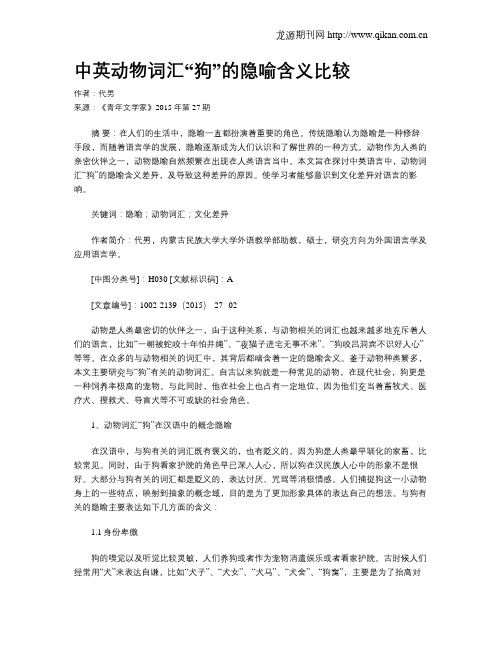
中英动物词汇“狗”的隐喻含义比较作者:代男来源:《青年文学家》2015年第27期摘要:在人们的生活中,隐喻一直都扮演着重要的角色。
传统隐喻认为隐喻是一种修辞手段,而随着语言学的发展,隐喻逐渐成为人们认识和了解世界的一种方式。
动物作为人类的亲密伙伴之一,动物隐喻自然频繁在出现在人类语言当中。
本文旨在探讨中英语言中,动物词汇“狗”的隐喻含义差异,及导致这种差异的原因。
使学习者能够意识到文化差异对语言的影响。
关键词:隐喻;动物词汇;文化差异作者简介:代男,内蒙古民族大学大学外语教学部助教,硕士,研究方向为外国语言学及应用语言学。
[中图分类号]:H030 [文献标识码]:A[文章编号]:1002-2139(2015)-27--02动物是人类最密切的伙伴之一,由于这种关系,与动物相关的词汇也越来越多地充斥着人们的语言,比如“一朝被蛇咬十年怕井绳”、“夜猫子进宅无事不来”、“狗咬吕洞宾不识好人心”等等。
在众多的与动物相关的词汇中,其背后都暗含着一定的隐喻含义。
鉴于动物种类繁多,本文主要研究与“狗”有关的动物词汇。
自古以来狗就是一种常见的动物,在现代社会,狗更是一种饲养率极高的宠物。
与此同时,他在社会上也占有一定地位,因为他们充当着畜牧犬、医疗犬、搜救犬、导盲犬等不可或缺的社会角色。
1、动物词汇“狗”在汉语中的概念隐喻在汉语中,与狗有关的词汇既有褒义的,也有贬义的。
因为狗是人类最早驯化的家畜,比较常见。
同时,由于狗看家护院的角色早已深入人心,所以狗在汉民族人心中的形象不是很好。
大部分与狗有关的词汇都是贬义的,表达讨厌、咒骂等消极情感。
人们捕捉狗这一小动物身上的一些特点,映射到抽象的概念域,目的是为了更加形象具体的表达自己的想法。
与狗有关的隐喻主要表达如下几方面的含义:1.1身份卑微狗的嗅觉以及听觉比较灵敏,人们养狗或者作为宠物消遣娱乐或者看家护院。
古时候人们经常用“犬”来表达自谦,比如“犬子”、“犬女”、“犬马”、“犬舍”、“狗窝”,主要是为了抬高对方的身份。
认知语言学视角下英汉十二生肖动物隐喻的对比研究
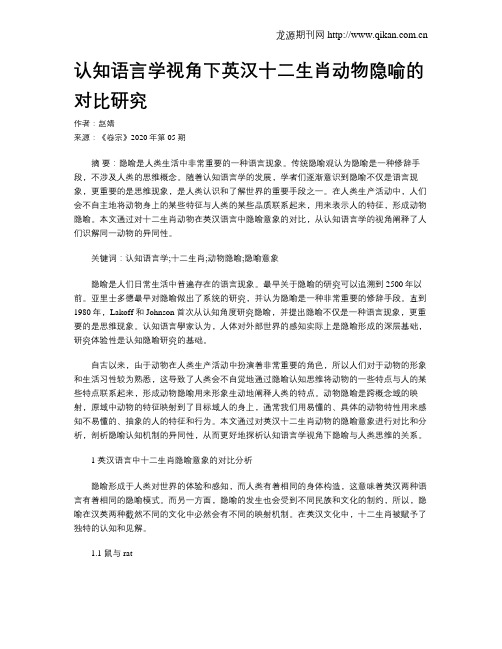
认知语言学视角下英汉十二生肖动物隐喻的对比研究作者:赵婧来源:《卷宗》2020年第05期摘要:隐喻是人类生活中非常重要的一种语言现象。
传统隐喻观认为隐喻是一种修辞手段,不涉及人类的思维概念。
随着认知语言学的发展,学者们逐渐意识到隐喻不仅是语言现象,更重要的是思维现象,是人类认识和了解世界的重要手段之一。
在人类生产活动中,人们会不自主地将动物身上的某些特征与人类的某些品质联系起来,用来表示人的特征,形成动物隐喻。
本文通过对十二生肖动物在英汉语言中隐喻意象的对比,从认知语言学的视角阐释了人们识解同一动物的异同性。
关键词:认知语言学;十二生肖;动物隐喻;隐喻意象隐喻是人们日常生活中普遍存在的语言现象。
最早关于隐喻的研究可以追溯到2500年以前。
亚里士多德最早对隐喻做出了系统的研究,并认为隐喻是一种非常重要的修辞手段。
直到1980年,Lakoff 和Johnson 首次从认知角度研究隐喻,并提出隐喻不仅是一种语言现象,更重要的是思维现象。
认知语言學家认为,人体对外部世界的感知实际上是隐喻形成的深层基础,研究体验性是认知隐喻研究的基础。
自古以来,由于动物在人类生产活动中扮演着非常重要的角色,所以人们对于动物的形象和生活习性较为熟悉,这导致了人类会不自觉地通过隐喻认知思维将动物的一些特点与人的某些特点联系起来,形成动物隐喻用来形象生动地阐释人类的特点。
动物隐喻是跨概念域的映射,原域中动物的特征映射到了目标域人的身上,通常我们用易懂的、具体的动物特性用来感知不易懂的、抽象的人的特征和行为。
本文通过对英汉十二生肖动物的隐喻意象进行对比和分析,剖析隐喻认知机制的异同性,从而更好地探析认知语言学视角下隐喻与人类思维的关系。
1 英汉语言中十二生肖隐喻意象的对比分析隐喻形成于人类对世界的体验和感知,而人类有着相同的身体构造,这意味着英汉两种语言有着相同的隐喻模式。
而另一方面,隐喻的发生也会受到不同民族和文化的制约,所以,隐喻在汉英两种截然不同的文化中必然会有不同的映射机制。
英汉动物隐喻的比较
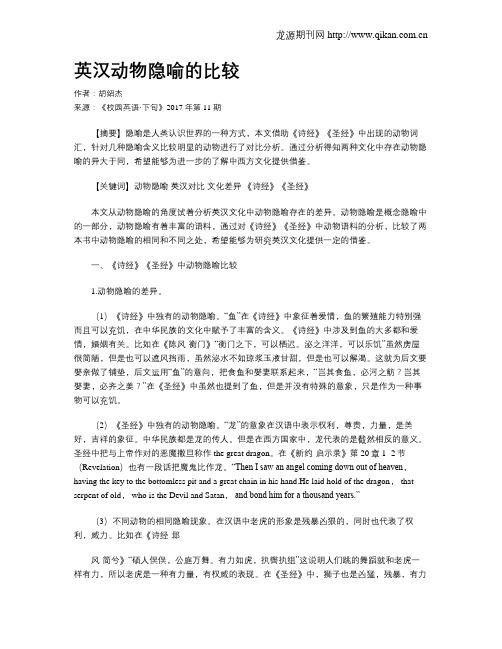
英汉动物隐喻的比较作者:胡绍杰来源:《校园英语·下旬》2017年第11期【摘要】隐喻是人类认识世界的一种方式,本文借助《诗经》《圣经》中出现的动物词汇,针对几种隐喻含义比较明显的动物进行了对比分析。
通过分析得知两种文化中存在动物隐喻的异大于同,希望能够为进一步的了解中西方文化提供借鉴。
【关键词】动物隐喻英汉对比文化差异《诗经》《圣经》本文从动物隐喻的角度试着分析英汉文化中动物隐喻存在的差异。
动物隐喻是概念隐喻中的一部分,动物隐喻有着丰富的语料,通过对《诗经》《圣经》中动物语料的分析,比较了两本书中动物隐喻的相同和不同之处,希望能够为研究英汉文化提供一定的借鉴。
一、《诗经》《圣经》中动物隐喻比较1.动物隐喻的差异。
(1)《诗经》中独有的动物隐喻。
“鱼”在《诗经》中象征着爱情,鱼的繁殖能力特别强而且可以充饥,在中华民族的文化中赋予了丰富的含义。
《诗经》中涉及到鱼的大多都和爱情,婚姻有关。
比如在《陈风·衡门》“衡门之下,可以栖迟。
泌之洋洋,可以乐饥”虽然房屋很简陋,但是也可以遮风挡雨,虽然泌水不如琼浆玉液甘甜,但是也可以解渴。
这就为后文要娶亲做了铺垫,后文运用“鱼”的意向,把食鱼和娶妻联系起来,“岂其食鱼,必河之鲂?岂其娶妻,必齐之姜?”在《圣经》中虽然也提到了鱼,但是并没有特殊的意象,只是作为一种事物可以充饥。
(2)《圣经》中独有的动物隐喻。
“龙”的意象在汉语中表示权利,尊贵,力量,是美好,吉祥的象征。
中华民族都是龙的传人。
但是在西方国家中,龙代表的是截然相反的意义。
圣经中把与上帝作对的恶魔撒旦称作the great dragon。
在《新约·启示录》第20章1- 2节(Revelation)也有一段话把魔鬼比作龙。
“Then I saw an angel coming down out of heaven,having the key to the bottomless pit and a great chain in his hand.He laid hold of the dragon, that serpent of old, who is the Devil and Satan,and bond him for a thousand years.”(3)不同动物的相同隐喻现象。
- 1、下载文档前请自行甄别文档内容的完整性,平台不提供额外的编辑、内容补充、找答案等附加服务。
- 2、"仅部分预览"的文档,不可在线预览部分如存在完整性等问题,可反馈申请退款(可完整预览的文档不适用该条件!)。
- 3、如文档侵犯您的权益,请联系客服反馈,我们会尽快为您处理(人工客服工作时间:9:00-18:30)。
动物隐喻在汉语和英语中的比较[Abstract]Animal metaphor, as a kind of metaphor, refers to a cognitive process in which some aspects of human beings are understood or experienced through the aspects of animals. The meanings of animal metaphors are determined by culture. Because it is based on human’s experience, there are many similarities in English and Chinese animal metaphors. But due to the differences in cultural backgrounds which include the influence of history, religion, geography, custom, and the way of thinking, there are different attitudes towards the animal metaphors. There are many figurative expressions in English and Chinese cultures, especially animal metaphors. Although English and Chinese are rich in animal words, they bring some problems because of the different cultures. Because human beings accumulate experience and knowledge from their practice and express them by language, different languages contain and represent different cultures. Therefore the comparison of animal metaphors becomes the method of getting to know the different cultures.[Key words]animal metaphor,communication,comparison,cultureI. IntroductionHuman beings and animals are both the products of natural evolution, and there has existed some inseparable relations between man andanimals since human beings created languages which are the carrier and container of cultural information.Metaphor, as a linguistic and cognitive phenomenon is an important way of understanding human cognition. Animal metaphor, as a kind of metaphor, refers to a cognitive process in which some aspects of human beings are understood or experienced through the aspects of animals. The meanings of animal metaphors are determined by culture. Because it is based on human’s experience, there are many similarities in English and Chinese animal metaphor. But due to the differences in cultural backgrounds which include the influence of history, religion, geography, custom, and the way of thinking, there are different attitudes towards the animal metaphor (Qin 2010). These differences lead to the diversity of language finally. This paper attempts to analysis the animal metaphors’differences and similarities and some methods to translate them are also addressed.Ⅱ. The Similar Meaning of Same Animal in bothEnglish and ChineseAs all human beings live in the similar environment, there is some same knowledge about animals. Therefore, they have the same or similar figurative meanings to animal words. For example, in English someonewould sayp The other animal that there is similar meaning in English and Chinese is sheep or lamb which is usually considered as sweet and tame. As a result, it is used to show the sweet and tame character. We can not forget the other animal, wolf. On the contrary, it refers to greedy and cruel. So in Chinese there exits many metaphors to describe its characters such as“狼狈为奸”, “狼子野心”. In English we can find the similar examples: “a wolf in a sheep’s clothing or a wolf in lamb’s skin”, “hold a wolf by the ears”. In addition, asses are regarded as stupid, e.g. “ass in grain (十足的大傻瓜)”; “an a ss in a lion’s skin (from Aesop’s Fables, 冒充聪明人的傻瓜)”; “all asses wag their ears (谚语:驴子摇耳朵,傻瓜装聪明)”. What’s more, bees are regarded as busy, birds are associated with freedom and nails are related to be slow. To parrot what others say and as grace as a swan also have the similar metaphor meanings. Pig refers to a greedy, dirty or bad-mannered person both in Chinese and English for instance eat like a pig and make a pig of oneself.The word “dove” in Chinese and English shares the same meaning, and symbolizes for peace. We regard the dove as “peace dove”. In some grand celebrations, we often see the scene of taking the doves away, standing for cherished desire for peace world of all of us. We can see the phenomenon in National Day in China.Let’s take our famil iar animal word “dog” for example. The dog isclosely related with people. In Chinese and English, the dog both has the commendatory and derogatory sense. Compared with Chinese, most of the “dog” expressions possess a commendatory sense or at least a neute r sense in English. It can be used to refer to certain people as “big dog (重要人物)”, “top dog (优胜者)”, “lucky dog (幸运儿)”, etc. in English. “To help a lame dog over the stile” means “to help someone in difficulty”. “Every dog has its day,” means “every person will succeed or become fortunate.” But in Chinese the word in most Chin ese phrases is associated with some derogatory meanings, as the sayings like “狗胆包天、狗头军师、狗腿子、狗血喷头、狼心狗肺、狗眼看人低”, etc. Although most Chinese people think the dog is man’s faithful friend, it usually has the derogatory metaphor. It seems that this animal is really very closely related with people so that person knows its feature and like to use the metaphor about it no matter what is good or bad.Because of the similar reason, in some cases the word may have derogatory sense in English, as is shown in the following examples: “yellow dog (卑鄙之人)”, “dirty dog (龌龊之人)”, “sly dog (阴险之人)”, “dead dog (无用的人)”. Meanwhile some vulgar languages also use it to express the derogatory sense.Ⅲ. Special Animals in Chinese and English3.1 Meaningful in English but meaningless in ChineseOstrich is a kind of large bird with a long neck and long legs, living in the area of African deserts. It can not fly but run very fast. In the English culture, “ostrich” has such figurative meanings like stupid evading and having a good appetite”. Its figurative meaning wo uld be reflected in the following expression: “Ostrich belief (鸵鸟信念)” .This belief is referred to deceptive idea. “To bury one’s head ostrich-like in the sand” is a person who prefers to ignore problems rather than go to have a try and deal with them. In addition, there exists another saying “have the digestion of an ostrich (胃口好如鸵鸟)”. It just shows the meaning of having a good appetite. With the development of the society, Chinese also use this metaphor which is always connected with the idea of evading. Although it is used, Chinese seldom consider the other meanings. However, in the past to most Chinese people, an ostrich is only a kind of animal without any figurative meanings.In Western culture, the goat is generally thought to be related with evils and the devil. In the legend, the devil created the goat, which is regarded as the phantom of the devil. Therefore the goat typically stands for those immoral people who are fond of women immorally.There are some sentences like these “The stock visited Howard Johnstons yesterday” or “you chicken.” The first one refers to the birth of a baby and the second one means that you are coward.Beaver is someone who works hard, cat is a woman who has a poisonous heart, cock is someone who is a leader, nightingale is someone who tells the secret, and a shark is a dishonest businessman.3.2 Meaningful in Chinese but meaningless in EnglishFor Chinese people, we must be very familiar with the words crane and tortoise, a symbol for longevity in Chinese culture. Therefore, some Chinese parents like to name their children as crane with the hope that their children live a long life. The crane is often linked with the pine tree, which is a symbol for sturdiness and long life. In China, it is a good way for people to send gifts with such designs of crane and pine tree to the older generations, especially on their birthday celebrating However they do not use the tortoise as it has derogatory meaning. One is longevity because of its physical features. Stone tortoises symbolic of venerable old ages can be seen in front of ancient halls, temples and palaces. The other is the symbol for the cuckold. But cranes are just ordinary animals in English. Mandarin Duck and silk worm also play important roles in Chinese. Mandarin duck is regarded as couple. Chinese often use it to express that the couple has good relationship with each other. Or they hope the new couple stays together happily forever. It stands for love .Silkworm has the meaning of hard working.Ⅳ. The Different Meaning of Animals4.1 The different meanings of same animalsWe are sure to be familiar with dragon and phoenix which are significant in Chinese culture. At beginning, we will try to get to know them in Chinese culture. No matter in ancient time or in modern time, we still think that dragon and phoenix represent sacred and notable. Dragon is the symbol of the Chinese nation, especially in the ancient time, people worshiped dragon to beg for rain Chinese people consider that they are descendents of the dragon. In ancient the Chinese emperors call themselves the sons of dragons. Phoenix is the king of birds. In Chinese phoenix represents the high position and good luck. (Luo 2007) .It usually has two: one is male we call it feng and the female one is called huang. What’s more, dragon and phoenix usually appear and refer together. So the wives of the emperors are called phoenix. Their clothes even anything is related them. Finally there are many metaphors about dragon and phoenix such as 龙凤呈祥,龙飞凤舞.In fact there is no evidence to prove that they ever exist but both these two cultures endow them meanings. Dragon is completely opposite in Chinese and English either in its shape or meanings. In Western people’s minds, the dragon is some evil monster with a large tail with wings and claws, breathing out fire and smoke. It symbolizes evil. However, phoenix means pure and rebirth.Monkey has different figurative meaning in Chinese and English languages. In Chinese, “monkey” is often likened to a sm art and agile person, with commendatory sense. The Chinese people often jokingly call clever and cute children “little monkey”. But, if you praise a western child “You are like a little monkey,” he will be angry, thinking that you curse him. Because in Eng lish, “little monkey,” means “a troublesome playful child”. And “monkey” is often likened to a person with a whole bag of tricks.In English the petrel is considered as an omen of disaster. However, in China the word “petrel” is associated with braving har dship and adversity, advancing with perseverance and courage. The spirit is well reflected in the poem petrel written by Gorky, a famous Russian writer. The magpie is a symbol of bad luck in English but opposite in Chinese. There are two explanations in The Oxford Advanced Learner’s English-Chinese Dictionary: (a) person who collects or hoards things (爱收藏或贮藏东西的人), (b) person who chatters a lot (爱饶舌的人). All these explanations are figurative with derogatory meanings. On the contrary, a magpie is a symbol of good luck in China. If a magpie sings in a tree near houses, people would think some happy things would happen. Chinese people often say, “Magpie sings, happy thing comes.” because the pronunciation of magpie in Chinese represents good luck. The legend about the magpie tells the story of love. The beautiful fairy who lives inthe heaven falls in love with the ordinary boy. Unfortunately the girl’s mother does not allow their romantic love, so she let them live in the different sides of the Milky Way. They should have not met each other forever. To our pleasure, the magpie helps them by building the bridge which is across the river so that they can get together one day in a year. What’s about fish In English “fish” often has derogatory meaning that refers to bad things and persons, e.g.: “a poor fish (可怜虫)”; “a loose fish (生活放荡的女人)”; “fish in the air (水中捞月)”. In Chinese the pronounce of fish is similar with 余. Therefore, in the important festivals such as Spring Festival, Chinese people would like to use “fish” as an indispensable dish to symbolize “abundance”.In Chinese “bear” means “cowardly and timid” or “stupid” but people use “bear” to refer to those persons having special ability in English for instance he is a bear at music. Sometime bear is someone who is rude in English. In English sayings that as wise as an owl. It shows that English-speaking people put owl as a symbol of intelligence. At children’s books and cartoons, the owls are usually very serious, very minds, While Chinese people are afraid to see owl or hear its sound. They think it stands for bad luck.4.2 The different animals but same meaningsDifferent animal words have similar cultural connotations in Englishand Chinese languages and people use different animal words to express similar meanings. For instance, agriculture is the foundation of China’s economic development, so the cattle play a great role in Chinese culture. There are so ma ny expressions which use “cattle” as association vehicles. Meanwhile horse is important in English people’s life so they say that as strong as a horse or to work like a horse while we use cattle to express.In Chinese, tiger is regarded as the king of animals and stands for power, vigor and bravery. So there are many expressions with the letter : “英雄虎胆”, “龙争虎斗”, “藏龙卧虎”, “如虎添翼”, “虎将”, etc. But in English “tiger” symbolizes cruelty. The western regards “lion” as the king of animals. They think it is brave and powerful. They use “as bold as a lion” to describe a brave person. It is full of the respect in English which can be proved in these phrases regal as a lion, majestic as a lion and to see the lions (游览名胜古迹).So when people translate them, they should find the right translation like talk horse (吹牛) and a lion in the way (拦路虎).In addition the rabbit and the rat also share the similar meaning. They both describe the person who is lack of brevity and always afraid of anything for example as timid as a rabbit is translated as胆小如鼠.Ⅴ. Translation of Animal MetaphorsTranslation is a dialogic process. The purpose of translation is to transfer the source language into the target language to obtain the maximal equivalence. So translators play an important role in the process of translation. They should consider how to deal with the images of the words and how to express the figurative meanings correctly and properly. Meantime, they should think over not only the language structures and national features in source language but also the cultural backgrounds and the expressions in target language. Animal words contain many cultural meanings. In the process of translating animal words, the big problem is how to get the same or nearly the same effect culturally in the target language as that of the source language.English culture and Chinese culture have much in common, so the English and the Chinese share the same or similar feelings or attitudes to some animal words. And they use the same animal images to express the similar figurative meanings. Therefore, we can adopt literal translation to keep the original association vehicles. For example: (1)You stupid ass! How could you do a thing like that (2)dark horse (黑马), paper tiger (纸老虎), lamb duck (跛脚鸭子). Keeping image of association vehicles can make language vivid and vigorous and preserve the original style.English language and Chinese language have some cultural discrepancies. If some original association vehicles are kept in theprocess of translation, the target language readers may not understand them. Indeed, there are occasions where certain cultural aspects of original cannot be directly transferred into the target language culture. Thus, in the process of intercultural communication, we may replace the original image with a different one that retains the meaning of the original message and well fits in with the target language. For example: Mr. Smith may serve as a good secretary, for he is as close as an oyster.史密斯先生可以当个好秘书,因为他守口如瓶。
